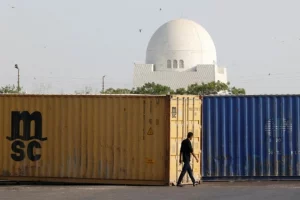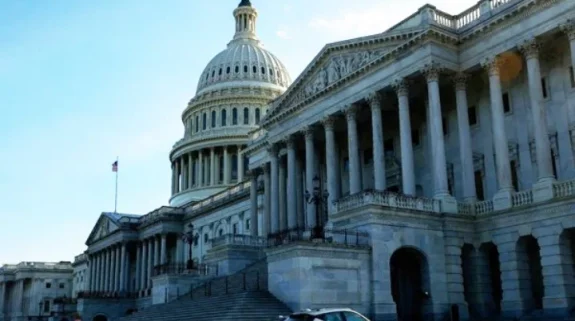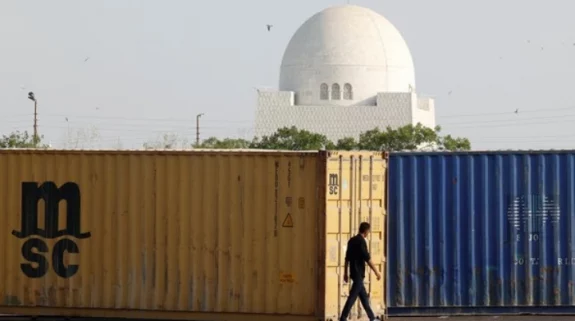Protests gather unprecedented pace across Myanmar denouncing China for this month’s military coup that overthrew the elected civilian government of Aung San Suu Kyi. Thousands of people took to the streets despite a surge in violence from the security forces. So far, the generals have been unable to quell the anti-coup and anti-China protests.
Conspiracy theories are abounding about the presence of Chinese techies, which are helping the new military junta build its own “firewall” to control the internet. Rumours are also mushrooming about on nightly flights between Yangon and the southern Chinese city of Kunming and what is being transported in them. Online social media is inundated with photos and videos of the protests looking for Chinese military insignia on uniforms and even fair-skinned soldiers among the armed forces that have been deployed to the streets.
Some excellent anti-#China art work in #Myanmar protests.
with music by the People’s Liberation Army 🙂#MyanmarCoup #CDM #WhatsHappeninglnMyanmar pic.twitter.com/oE8CobzUm7
— Joseph (@Josh40206875) February 19, 2021
China’s failure to join the international community in condemning the Myanmar military takeover has fuelled rumours among protesters that Beijing has been backing the junta by helping it build an internet firewall and sending soldiers to quell protests.
In contrast, the European Union ministers agreed on Monday to sanction the Myanmar military over its seizure of power and to withhold some development aid, the bloc's top envoy said. "We took the political agreement to apply sanctions targeting the military responsible for the coup and their economic interests," foreign policy chief Josep Borrell said.
US President Joe Biden had earlier approved an executive order for new sanctions on those responsible for the coup. In a statement issued on Thursday, the US Treasury Department said it had frozen all US-based assets of 10 current and retired top-ranking individuals.
Happening near Indonesia Embassy
Since security forces block Pyi Htaung Su Yite Thar Road near Chinese and Indonesia Embassies, ppl conduct sit-in nearby and demanding what Myanmar wants!
📸 Irrawaddy #WhatsHappeningInMyanmar#Feb23Coup pic.twitter.com/t3BBmoLEme— Kai Gracey (@GraceyKai) February 23, 2021
China has the power to restore civilian rule in Myanmar. It should help the peole of Myanmar, not the generals, is the common refrain among protestors on the streets. Protestors are urging China President Xi Jinping not to recognise Myanmar’s military regime and stand with the Myanmarese, amid growing calls for boycotts of Chinese goods and services.
The coup has again put China in the position of having to stand up for the regime as its long-time friendly neighbour although this support has undermined Beijing’s image in Myanmar and abroad. Analysts say Myanmar’s public opinion sees China as a supporter of propping up the military once again and abandoning the elected government that puts China in opposition to the Myanmarese people.
Anti-Chinese sentiment has a long history in Myanmar, both on the national level and at the local level, due to conflicts among ethnic Chinese communities and others. Chinese investment projects have been major flashpoints following the move toward democracy. Locals have decried the environmental impacts and forced relocations associated with such projects, while Beijing has been keen to get them restarted.
Monks' protest march against dictatorship.
They stop for a while at China embassy because China used Veto while discussing about myanmar coup in UN Security Council Meeting.#China#Buddhism pic.twitter.com/scp5cYTrcS— Shin Nyein Min (@shinnyeinmin) February 21, 2021
One of the reasons why Myanmar’s military allowed limited democracy in the last decade was out of fear that it was becoming too dependent on China as its only backer since it was cut off from the rest of the world through sanctions. The military now seems to value its own power over the risk of dependence on a giant neighbour.
Furthermore, the military leaderships have demonstrated over the years that it harbours deep suspicions of China’s intentions in the country. The military has always been very apprehensive about China’s alleged backing for insurgent militia groups along the border and has in the past stirred up the anti-Chinese sentiment. It has also cancelled infrastructure projects central to China’s interests in the country.
In contrast, Aung San Suu Kyi’s government entered into major infrastructure projects with China including the China-Myanmar Economic Corridor, an initiative worth billions of dollars that includes a railway and deep-water port as part of China’s Belt and Road project. It had also signed the Regional Comprehensive Economic Partnership free trade agreement that includes China, Myanmar’s biggest trading partner.
Thursday, 18 February
Yangon, #Myanmar (#Burma)Protest against the military coup
In front EMBASSY OF THE PEOPLE’S REPUBLIC OF #CHINA 🇨🇳 #ReleaseOurLeader#RespectOurVotes #RejectMilitaryCoup#Feb18Coup pic.twitter.com/Dg88uyIf18— Min Min (@SoeMinMinKyaw) February 18, 2021
Yet in Myanmar, the best way to achieve such ends may not be backing a military coup, especially given the strong ties and leverage Beijing had built with Aung San Suu Kyi and her government, analysts say.
One of China’s major strategic goals in Myanmar is to gain access through ports and pipelines to the Indian Ocean and thereby reduce dependence on the potential chokehold of the Strait of Malacca. China may not be cheering Myanmar’s military takeover but captivated by its narrow national interests, It leaves little room for Beijing to denounce the coup.




















